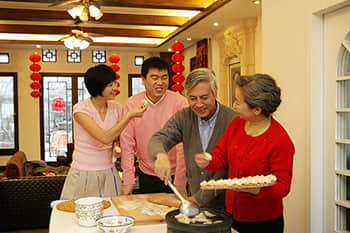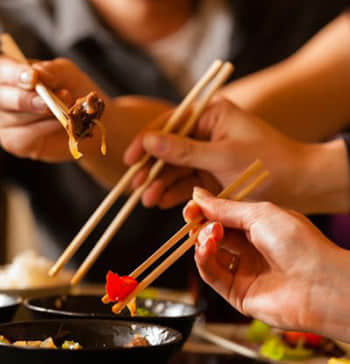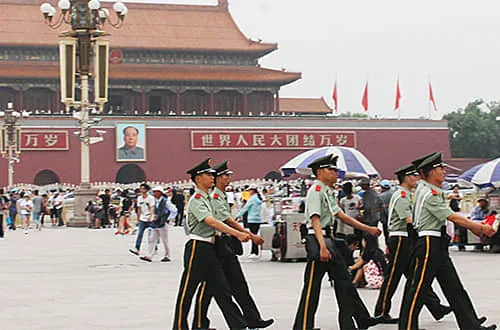Home Stay in China

Your trip to China is likely to be the best experience of your life (so far)! You will get to see some amazing scenery and observe remarkable cultural activities. However, the best part of your trip could be if you get to stay in a Home Stay with a Chinese family.
What is a Chinese family like?

China’s ‘One Child Policy’ has been in effect for nearly 40 years, and so most Chinese families consist of a mother, father and one child (except for certain exceptions where they have two children). It is not uncommon for one or more of the grandparents to live with the family too.
Most Chinese people live in high density housing in large over-crowded cities. From a distance these groups of huge apartment towers gathered in a compound around one or two small areas of parkland can appear intimidating, especially if you are not familiar with this type of lifestyle.
The lovely surprise is that once you get inside one of these apartments, they are really charming and surprisingly spacious. As much as everyone else, Chinese people are very house-proud and appreciate stylish furniture and other beautiful things, if they can get them. However, there are one or two things that may be different from what you are used to, but if it was all exactly the same then it would hardly be an adventure, would it?
Generally, these city apartments have three bedrooms, a living room, a kitchen, and a bathroom. It is normal to slip your shoes off as you enter the home, and slip your feet into some indoor slippers that are provided.
In the bathroom, there will be a western toilet. (Only public toilets are usually squat style.) The shower generally does not have a curtain or a separate stall, and everything can end up very wet. There is rarely a bath, but there will be a small water heater. Chinese people commonly take a shower before bed, and may consider it strange if you are one of those people who like a morning shower.
The washing machine is in the bathroom, and the washing is hung out on the balcony where there is a system of pulleys to lower and raise the lines. (People don’t often sit out on their balconies.)
The kitchen can be a bit different, with a cooktop that only has two powerful burners – ideal for cooking in a wok – and a strong extractor fan. Some people have a microwave, but ovens are uncommon and so are dishwashers. There will be a fridge, but it may be in a space outside of the small kitchen. They probably have a water dispenser offering bottled drinking water, a choice of hot and lukewarm – they don’t drink cold water.
The bedrooms have normal-looking beds, but the Chinese tend to like their beds very hard. Some foreigners like to add a layer of padding to make it more comfortable.
In cold weather (and hot weather) the Chinese are used to the idea of saving electricity by not turning on heaters or air conditioners until it is absolutely necessary, preferring to wear (or remove) layers of clothing according to the weather.
There is often no elevator for apartments that are lower than the 7th floors, so you may get a little extra exercise taking the stairs.
Can the family members speak English?
Not all family members will necessarily speak English, and maybe no one will speak fluent English, but there will be at least one person with enough English for you to communicate with.
Most Chinese people have studied some English, many have even studied overseas, and they will be looking forward to practicing and improve their English with you.
Listen carefully to everything. Speak clearly, and a little more slowly than usual. Get creative and use illustrations and gestures if necessary – it is much more fun than a game of charades! And the sense of achievement when communication takes place is well worth any effort.
Learn at least a few Chinese phrases, and then have fun learning some more while you are there.
What do Chinese families usually eat at home?

Hopefully you are not expecting cereal and toast for breakfast because Chinese breakfasts are much more interesting than that. A lot of people buy a delicious breakfast snack at a stall on the way to school or work as this meal is can be fairly hurried. However, with you as a guest they may choose to cook you some interesting rice porridge or congee, some fried dough sticks, steamed buns, or boiled noodles, and likely even a boiled or fried egg that isn’t quite the same as you have had at home.
You won’t be at home for lunch, but you will have one or two dinners with your family. This meal is likely to include a bowl of rice (or noodles), as well as a variety of small dishes of stir-fried meats and vegetables with different seasonings for you to sample with your bowl of rice.
What should I prepare?
Be prepared with an open-minded attitude, and be appreciative of the effort your family will make to communicate with you and help you feel at home.
It’s a good idea to bring a small gift or two to break the ice with your host family. It should be something small and light – you don’t want heavy items in your luggage – and inexpensive. It could be some small touristy souvenir item from your home town, or something like a pictorial calendar with photos of your home town or state.
Your host family will want to know about your family and life back home, so bring some photos to show them. Maybe even bring one or two hard copies to leave with them to remember you by.
Practice eating with chopsticks so you can be relaxed and comfortable at meal times.
Learn a few basic Chinese phrases – such as “Thank You!” – because you know it will please your host family by showing them that you are interested in the culture and language.
Do’s and Don’ts
This experience will make you eager to return to China again and again, and even persuade your friends to go too. As with any worthwhile venture, how much you get out of your Home Stay visit depends on how much you are willing to put into it.
Here are some basic Do’s and Don’ts.

- Do smile and be friendly, even when you are nervous. Your hosts are probably nervous too.
- Do tell your hosts if you have a problem they can help you with.
- Do listen carefully and speak clearly with your host family.
- Do take your shoes off when you go into the apartment.
- Do be punctual about getting up and getting ready for school in the morning.
-
Do remember these things about table manners:
- It is okay to have more bowls of rice, but do leave your final bowl unfinished to show that you have been satisfied.
- When you have finished eating, don’t leave your chopsticks standing up in your rice (because it looks like a grave), just lay them on the table.
- Meat (and fish) dishes will usually include bones. Do spit them carefully onto the table next to your bowl (using your chop sticks, if you can).
- People make slurping and other noises that you would be told off for at home, that’s okay. But you don’t lick your fingers.
- Don’t expect everything to be the same as back home.
- Don’t get impatient when things are not happening like you expect.
- Don’t leave your room and your things in an untidy mess when you go out to school.

 Privacy and Personal Space in China
Privacy and Personal Space in China  Is It Safe To Travel To China?
Is It Safe To Travel To China?  How can I travel safely if I have Allergies?
How can I travel safely if I have Allergies?  Why do Chinese people always talk so loudly?
Why do Chinese people always talk so loudly?